英国文学简介--General Introduction to British Literature
英国文学简介--General Introduction to British Literature
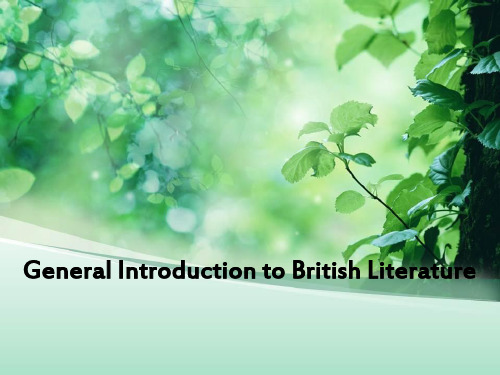
Sir Gawain and the Green Knight, 1375-1400
Medieval Literature
Geoffrey Chaucer He is regarded as the father of English
poetry. The Canterbury Tales is his
3. 17th Century British Literature
John Bunyan He is a religious novelist whose
style was modeled after that of the English Bible. His language is concrete and vivid. His masterpiece, The Pilgrim's Progress, is the most successful religious allegory.
英国文学Unit1Chaucer
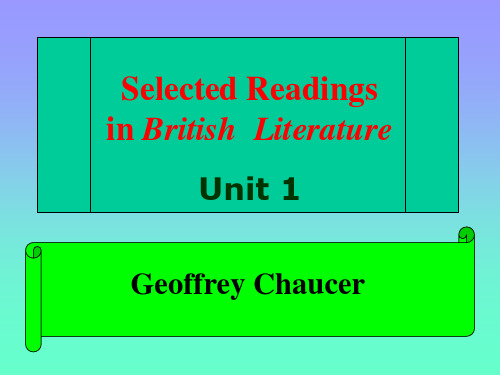
• Pilgrims traveled to visit the remains of Saint Thomas Becket, archbishop of Canterbury, who was murdered in 1170
当和风甜美的气息挟着生机吹进树林和原野上的嫩芽里年轻的太阳也已进入白羊座已把白羊座一半的路程走过而小鸟小雀唱着各自的曲调整夜里它们都睁着眼睛睡觉这是大自然拨弄出它们心声
Selected Readings in British Literature
Unit 1
Geoffrey Chaucer
• Geoffrey Chaucer
the dfoa-rDmUMwdaas-DpUeMrfectdead-DbUyMJdoah-nDUDMrydad-eDnUMand AleSxhaanlldIercoPmo-pPeAiRnE1th8ethe TcOentauSryU.M mer's DAY
The Canterbury Tales
Artistry of Language
speech. That’s why John Drydon called him “the
Father of English Poetry.”
Heroic Couplet (英雄双韵体)
• A heroic couplet is a traditional form for English poetry, particularly for epic and narrative poetry. It corresponds to a two line stanza in iambic pentameter. (押韵抑扬五音步)
英美文学史简介

英美文学史简介Part A British LiteratureⅠEarly and Medieval English Literature 早期及中世纪英国文学1. “Beowulf”, the national epic of the English people.《贝奥武夫》(Beowulf),完成于八世纪,约750年左右的英雄叙事长诗,长达3000多行。
是以古英语记载的传说中最古老的一篇。
是现存古英文文学中最伟大之作,也是欧洲最早的方言史诗。
2. Geoffrey Chaucer ,the founder of English poetry.乔叟(1343-1400),英国诗歌之父.The Canterbury Tales 《坎特伯雷故事集》, 以一伙来自社会各个阶层的香客在宗教朝圣的路上讲述故事为线索,向我们清楚地展示了那个时代人们的生活。
在所有的23个故事中,除了两篇之外,其余都是诗歌体裁的作品。
ⅡThe Renaissance [ri′neis(ə)ns] 文艺复兴时期文学1.William Shakespeare 莎士比亚(1564~1616)英国文艺复兴时期伟大的剧作家、诗人,欧洲文艺复兴时期人文主义文学的集大成者。
莎士比亚给世人留下了37部戏剧play,其中包括一些他与别人合写的一般剧作。
此外,他还写有154首十四行诗sonnet和三、四首长诗poem。
四大喜剧: A Midsummer Night’s Dream 仲夏夜之梦The Merchant of Venice 威尼斯商人As You Like It 皆大欢喜Twelfth Night 第十二夜四大悲剧:Hamlet 哈姆雷特(To be, or not to be, that is the question)Othello 奥赛罗King Lear 李尔王Macbeth 麦克白其他:Romeo and Juliet 罗密欧与朱丽叶2.Francis Bacon 培根(1561-1626 )The founder of English materialist philosophy and modern science.Bacon is especially famous for his Essays.培根,英国唯物主义和现代科学奠基人,散文家.代表作:散文Of Studies 《论学习》ⅢThe period of English Bourgeois [buə′ʒwɑ:] Revolution and Restoration 资产阶级革命时期文学1.John Milton 米尔顿Paradise Lost 《失乐园》2. John Bunyan 班扬The Pilgrim’s Progress 《天路历程》ⅣEighteenth Century English Literature 十八世纪英国文学1. Daniel Defoe: 笛福Robinson Crusoe 《鲁滨逊漂流记》2. Jonathan Swift:斯威夫特Gulliver’s Travels 《格列佛游记》3. Henry Fielding 菲尔丁the Founder of the English Realistic Nov 英国现实主义小说奠基人Joseph Andrew 《约瑟夫·安德鲁》4. William Blake 布莱克and Robert Burns彭斯: PoetⅤRomanticism in England 浪漫主义时期文学1. William Wordsworth 华滋华斯the representative poet of the early romanticism. 标志着浪漫主义的开始2. George Gordon Byron 拜伦Don Juan 《唐·璜》3. Percy Bysshe Shelley 雪莱Prometheus Unbound《解放了的普罗米修斯》If winter comes, can spring be far behind? 冬天来了,春天还会远吗?4. John Keats 济慈Ode to a Nightingale 《夜莺颂》5. Jane Austen 简·奥斯汀Pride and Prejudice 《傲慢与偏见》ⅥThe Victorian Age 维多利亚时期文学1. Charles Dickens 狄更斯代表作:Oliver Twist 《雾都孤儿》、A Tale of Two Cities《双城记》、David Copperfield 《大卫·科波菲尔》2. William Makepeace Thackeray 萨克雷代表作:Vanity Fair 《名利场》3. George Eliot 乔治·艾略特4. The Brontë Sisters 勃朗特三姐妹Charlotte Brontë夏洛蒂·勃朗特:Jane Eyre《简·爱》Emily Brontë艾米莉·勃朗特:Wuthering Heights 《呼啸山庄》Annie Brontë安妮·勃朗特5. The Brownings 勃朗宁夫妇Husband: Robert BrowningWife: Elizabeth BrowningSonnets from the Portuguese 《葡语十四行诗集》ⅦTwentieth Century English Literature 20世纪英国文学1. Thomas Hardy 托马斯·哈代Tess of the d’Urbervilles《德伯家的苔丝》2. John Galsworthy 高尔斯华绥3. Oscar Wilde 王尔德Poet,dramatist, novelist and essayist.The Happy Prince and Other Tales 《快乐王子和其他故事》4. George Bernard Shaw 萧伯纳the most important English dramatist5. D. H. Lawrence 劳伦斯Lady Chatterley’s Lover 《查泰来夫人的情人》6. Virginia Woolf 伍尔芙Feminism, the stream of consciousness意识流女权主义与现代主义小说的先驱7. James Joyce 乔伊斯Ulysses《尤里西斯》the stream of consciousness意识流Part B American LiteratureⅠThe Literature During the Colonial American and the American Revolution殖民地时期及独立战争时期的文学Benjamin Franklin 本杰明·富兰克林ⅡAmerican Romanticism and New England Literature 浪漫主义及新英格兰时期文学1. Washington Irving华盛顿•欧文(1783-1859)the first American to achieve an international literary reputation. 是美国文学的奠基人之一。
ABriefIntroductiontoEnglishLiterature英国文学史
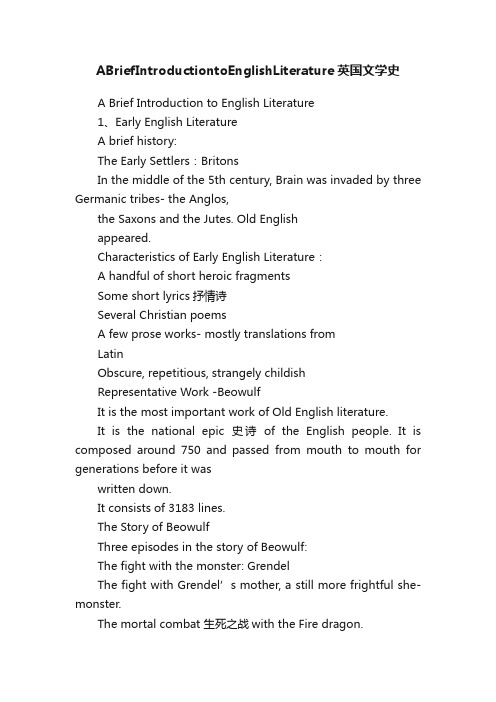
ABriefIntroductiontoEnglishLiterature英国文学史A Brief Introduction to English Literature1、Early English LiteratureA brief history:The Early Settlers:BritonsIn the middle of the 5th century, Brain was invaded by three Germanic tribes- the Anglos,the Saxons and the Jutes. Old Englishappeared.Characteristics of Early English Literature:A handful of short heroic fragmentsSome short lyrics抒情诗Several Christian poemsA few prose works- mostly translations fromLatinObscure, repetitious, strangely childishRepresentative Work -BeowulfIt is the most important work of Old English literature.It is the national epic史诗of the English people. It is composed around 750 and passed from mouth to mouth for generations before it waswritten down.It consists of 3183 lines.The Story of BeowulfThree episodes in the story of Beowulf:The fight with the monster: GrendelThe fight with Grendel’s mother, a still more frightful she-monster.The mortal combat 生死之战with the Fire dragon.The ideals of the ancient British People:Valor勇猛, the love of glory; honor, duty, loyalty and the generosity.The vivid portrayal of a great national hero who is brave, courageous, selfless, and ever helpfulto his people and his kinsfolk.Language features of Beowulf: The use of alliteration“Thus joined the m en of the Geats in m ourningTheir h ero’s end. His h earth-companionsCalled him the best among the kings of the earthK indest to k insmen and k eenest for fame.”The use of metaphors and understatements Metaphor:King: ring-giverAttendant warrior: hearth companionsSea: s wan’s path; whale’s roadSolider: shield-bearer; spear-fighterUnderstatement:Very welcome: not troublesomeCondemn: deed not praise(gives an impression of reserve and at times a tinge of ironical humor.)A mixture of pagan 异教徒and Christianelements:For example:Blood-revenge; the praise of worldly glory (pagan)The existence of Heaven and Hell (Christian)2、The Middle English Literature(1066-1485)Historical Background:The Norman Conquest:In 1066 England was conquered by the Normans lead by William the Conqueror, Duke of Normandy.The Normans brought with them their social organization, new laws and new speech.French became the dominant language at that time, and English was only spoken by people of lower classes.The century and a half after the Conquest, English literature almost stood still. It wasn’t until the 14th century that the Middle English literature began to awake.Forms of Middle English LiteraturePoemsKing Arthur and His Knights of the Round Table Popular Ballads民谣Robin HoodMedieval dramamiracle playsmorality playsInterludes幕间幽默短剧Representative WorkThe Canterbury Tales by Geoffrey ChaucerThe Canterbury Tales presents before the reader a panoramic 全景的view of the Medieval life.(1)Chaucer is an artist. His poem is rich in musicand elegant to a very high degree.(2)He is a keen observer of life.(3)The characters in his tales are most vividlydrawn.(4)He sympathizes with true piety and goodnessand attacks severely the hypocritical伪善的人.(5)He is a master of satire. The fusion of humorwith satire is the basic note of his style.Chaucer’s Contribution to English Literature (1)He introduced from France and Italy the rhymedstanzas of various forms to English poetry. (2)He is the first poet who wrote in current Englishlanguage.3、The English Renaissance Renaissance Literature (1485-1660)“Renaissance” means “Rebirth”--Rebirth of interest in the Greek and Latin classicsCharacteristics:(1)Emphasis on humanistic education forstatesmanship政治才能.(2)Focus on the individual and a concern with thefullest possible cultivation of human potentialthrough proper education; focus on individualconsciousness and the Interior mind(3)Concern with the refinement of the language andthe development of a national literatureThree Stages of the English RenaissanceThe Beginning (1485-1558)The Elizabethan Age (1558-1603)The Seventeenth Century (1603-1660)The Beginning of the English Renaissance (1485-1558)The Oxford ReformersThey were students and later teachers at Oxford University. They traveled and studied in Italy, introduced classical literature to England and tried to reform education on a humanistic line.The Elizabethan Age(1558-1603)The Age of ShakespeareIt is the peak of the English Renaissance, and is considered the most creative period in thehistory of English literature. A golden age.Famous names at that time:–Edmund Spencer–Christopher Marlowe–Ben Johnson–Francis Bacon–William ShakespeareEdmund Spencer(1552-1599)Spencer was called the “poets’ poet” because of his superb technical skills, perfect melodies, rare sense of beauty, splendid imagination, lofty moral purity and seriousness, and delicate idealism.Representative Work:The shepherd’s CalendarFrancis Bacon (1561-1626)The most important prose writer. The first English essayist.Some Essays Written by BaconOf studyOf friendshipOf beautyOf loveOf envyOf revengeOf travelOf Marriage and single lifeOf Parents and KidsQuotes From Bacon’s WorksKnowledge is powerIt is impossible to love and be wise.Natural abilities are like natural plants, that need pruning by study; and studiesthemselves do give forth directions toomuch at large, except they be bounded in byexperience.William Shakespeare (1564-1616)As the greatest English poet and dramatist, he left us a great wealth of 154 sonnets, 37 plays including 14 comedies, 12 tragedies and 11 historical plays, as well as 2 long poems.S ome of Shakespeare’s Great WorksThe Merchant of VeniceA Midsummer Night’s dreamThe TempestTwelfth NightRomeo and JulietJulius CaesarHamletOthelloKing Lear……Theme in Shakespeare’s PoemGood always overcame evil in the long run, and justice would eventually win its cause in the end. Love, faith, work and duty were the four elements that in all ages made the world right.Youth, love and ideal of happiness, as well as the victory of the humanist ideal after severe struggle against all obstacles.The heroes and heroines fight against destiny itself andmould their own fate according to theirown will.There is an unconquerable contradiction between humanist ideals and terrible social realities. Chief Achievements and Characteristics of Shakespeare’s Dr amaThe progressive significance of his themes.His successful character portrayal.His master hand高超的技艺in constructing plays.The ingenuity巧妙of his poetryHis mastery of English Language.The Seventeen’s Century (1603-1660) Characteristics of this age:It has no unity of spirit as in the days of Elizabeth.Much of the literature of this period is somber in character. It saddens rather than inspires us. Itdoesn’t have the hopefulness and vigor of theprevious age.It has lost the romantic impulse of youth and become critical and intellectual.Representative WorkJohn Milton and His Paradise LostThe rebellion of Satan and his fellow angelsTheir defeat and expulsion from HeavenThe creation of the Garden of Eden and the first man and woman Adam and Eve ?The fallen angels in hell plotting against GodSatan’s temptation of EveThe exile of Adam and Eve from Paradise John Milton:The great poet and prose writer.4、The Eighteen’s Century Literature(1660-1798)The rise of the English novelDaniel Defoe and his Robinson Crusoe.5、The Age of Romanticism (1798-1832) Characteristics:(1)The Spontaneous Overflow of PowerfulFeelings(2)The creation of a world of Imagination(3)The Return for Nature for Material(4)Sympathy with the Humble and Glorificationof the Common-place(5) A sense of Melancholy and loneliness(6)The Rebellious SpiritRepresentative Works●William Wordsworth: Lyrical Ballads●Robert Burns: Red Red Rose●George Gordon Byron: When we two parted;She walks in Beauty●Percy Bysshe Shelley: Ode to the West Wind ●John Keats: Ode to a Nightingale6、The Victorian Age(1832-1901)Literature CharacteristicsVariety in style and subject matter.The flourishing of realistic novels.The memorable poetry of the “Big Three”: Tennyson, Browning and Arnold.The emergence of the Aesthetic美学的Movement, represented by Oscar Wilde. Representative WorksCharles Dickens (1812-1870)Oliver TwistDavid CopperfieldA Tale of Two CitiesGreat ExpectationsWilliam Makepeace Thackeray (1811-1863) Vanity FairGeorge Eliot (1819-1880)MiddlemarchCharlotte Bronte (1816-1855)Jane EyreThomas Hardy (1840-1928)Tess of the D’Urbervilles7、The Twentieth Century Literature Modernism:Radical and deliberate break from traditional forms. Symbolism; Impressionism; Stream of Consciousness Modernist Poets:Yeats and Eliot Characteristics of their poems:Direct treatment of things and avoidance of any unnecessary words.Freer metrical韵律的movementSymbolism in the poemsCloser to that of conversation by the use of colloquial expressions and even slangs.Frequent use of irony and puns Modernism NovelistHenry James (1843-1916)Daisy MillerPortrait of a LadyThe Emphasis is laid on how a character feels rather than how he acts, and the conflict are moved from the outside world to the inner world of the characters.Psychological NovelistD.H. Laurence (1885-1930)Sons and LoversThe RainbowA combination of psychological analysis and social criticism。
英国文学第一章Lecture 1(Revised)
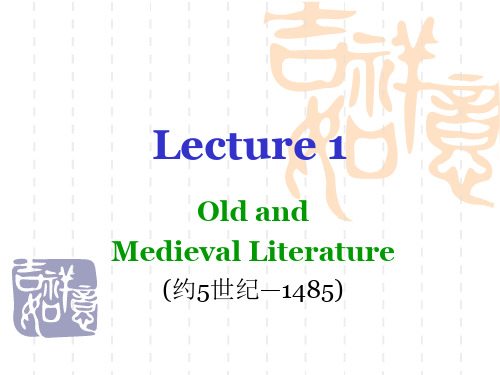
II. Learning Method sources of work and genre contents of the work (plot, theme, position in literary history) author’s attitude style
☼ We should analyze a literary work from the following three aspects, but remember, when we write a literature review, we should interpret the work from one aspect.
Celts—the earliest settlers of the British Isles
Cultural relics left over by the Celts
I. Old English Period (also called Anglo-Saxon Period, 450-1066) 1. Roman Conquest (前55年-410年) From 55 B. C. to 410 A.D. the British Isles were under the rule of Roman empire. Julius Caesar (102-44 B.C.) crossed the Dover Strait in 55 B. C., but Caesar himself only stayed there for a few weeks. Though the Romans built temples, roads, walls, and military camps, they made little influence on the cultural life of Celts.
英美国家概况Unit 6 British Literature (英国文学)
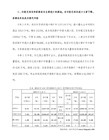
一、本单元重点内容
1. Beowulf {贝奥武夫(一首古英文史诗的名字,同时也是此诗中的英雄的名字)}
2. The Canterbury Tales by Geoffrey Chaucer (杰弗里·乔叟的《坎特伯雷故事集》)
1). British literature concerned with Christianity: Anglo-Saxons’ illustrated versions of the bible: the most famous--- the Book of Kells
2). Beowulf --- a long poem, one of the oldest of these early “Old English”(AD 6th C. —AD 11th C.的盎格鲁˙撒克逊的英语) literary works (古英语文学作品指8th C. AD—11th C. AD)
2. Elizabethan Drama (伊丽莎白一世:1533.9.7—1603.5.24)
---a general flowering of cultural and intellectual life in Europe during 15th and16th C. which is known as “The Renaissance”
7. Charles Dickens (查理·狄更斯)
8. Sir Walter Scott (瓦尔特·司各特)
9. Robert Louis Stevenson (罗伯特·路易斯·斯蒂文森)
10. Modernism (现代主义)
英国文学发展史及每个阶段的特点 中英对照
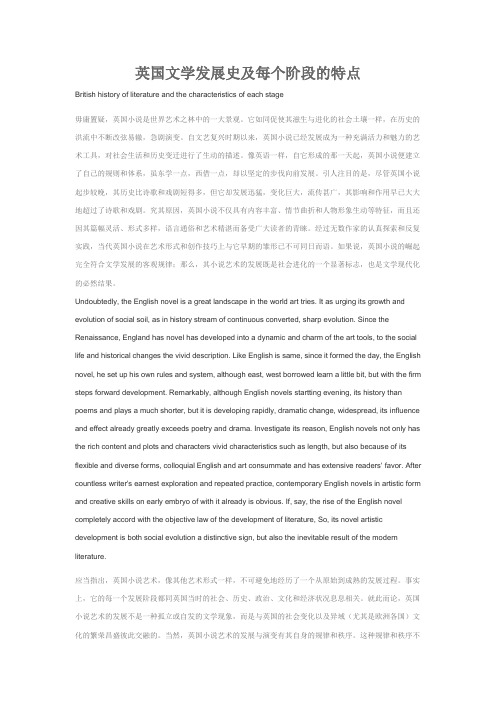
英国文学发展史及每个阶段的特点British history of literature and the characteristics of each stage毋庸置疑,英国小说是世界艺术之林中的一大景观。
它如同促使其滋生与进化的社会土壤一样,在历史的洪流中不断改弦易辙,急剧演变。
自文艺复兴时期以来,英国小说已经发展成为一种充满活力和魅力的艺术工具,对社会生活和历史变迁进行了生动的描述。
像英语一样,自它形成的那一天起,英国小说便建立了自己的规则和体系,虽东学一点,西借一点,却以坚定的步伐向前发展。
引人注目的是,尽管英国小说起步较晚,其历史比诗歌和戏剧短得多,但它却发展迅猛,变化巨大,流传甚广,其影响和作用早已大大地超过了诗歌和戏剧。
究其原因,英国小说不仅具有内容丰富、情节曲折和人物形象生动等特征,而且还因其篇幅灵活、形式多样,语言通俗和艺术精湛而备受广大读者的青睐。
经过无数作家的认真探索和反复实践,当代英国小说在艺术形式和创作技巧上与它早期的雏形已不可同日而语。
如果说,英国小说的崛起完全符合文学发展的客观规律;那么,其小说艺术的发展既是社会进化的一个显著标志,也是文学现代化的必然结果。
Undoubtedly, the English novel is a great landscape in the world art tries. It as urging its growth and evolution of social soil, as in history stream of continuous converted, sharp evolution. Since the Renaissance, England has novel has developed into a dynamic and charm of the art tools, to the social life and historical changes the vivid description. Like English is same, since it formed the day, the English novel, he set up his own rules and system, although east, west borrowed learn a little bit, but with the firm steps forward development. Remarkably, although English novels startting evening, its history than poems and plays a much shorter, but it is developing rapidly, dramatic change, widespread, its influence and effect already greatly exceeds poetry and drama. Investigate its reason, English novels not only has the rich content and plots and characters vivid characteristics such as length, but also because of its flexible and diverse forms, colloquial English and art consummate and has extensive readers' favor. After countless writer's earnest exploration and repeated practice, contemporary English novels in artistic form and creative skills on early embryo of with it already is obvious. If, say, the rise of the English novel completely accord with the objective law of the development of literature, So, its novel artistic development is both social evolution a distinctive sign, but also the inevitable result of the modern literature.应当指出,英国小说艺术,像其他艺术形式一样,不可避免地经历了一个从原始到成熟的发展过程。
英国文学史内容概述

Part 1. Old and medievห้องสมุดไป่ตู้l
Beowulf 贝尔武甫(the national epic of the English people) Stricking feature: alliteration, metaphors and understatements. 长诗:The House of Fame 声誉之堂;Troilus and Criseyde 特罗勒斯与克丽西德 Geoffrey Chaucer 杰佛利·乔叟 1340-1400 小说:Canterbury Tales 坎特伯雷故事集----英国文学史上现实主义第一部杰作 (他是最早有人文主义思想的作家,现实主义文学的奠基人) His contribution to English poetry: introduced from france the rhymed couplet of 5 accents in iambic meter (the heroic couplet), is the first great poet who wrote in the English language. Who making the dialect of London the standard for the modern English speech.
Part 2. The English renaissance
Thomas More 托马斯·莫尔 Philip Sidney 菲力普·锡德尼 Edmond Spenser 埃德蒙·斯宾塞 Francis Bacon 弗朗西斯·培根 1561-1626 Christopher Marlowe 克里斯托夫·马洛 William Shakespeare 威廉·莎士比亚 1564-1616 Advancement of Learning 学术的进展; Novum Organum 新工具; New Atlantic 新大西 岛; Essays 论文集(Of Studies 论学习;Of Wisdom for a Man’s Self) (The founder of English materialist philosophy) Tamburlaine 铁木耳大帝 Dr.Faustus 浮士德的悲剧 The Jew of Malta 马耳他的犹太人 The Passionate Shepherd 多情的牧羊人致情人 The Tempest 暴风雨; The Two Gentlemen of Veronaz 维罗纳二绅士;The Mercy Wives of Windsor 温莎的风流妇人;Measure for Measure 恶有恶报;The Comedy of Errors 错中 错;Much Ado about Nothing 无事自扰; Love’s Labour ’s Lost 空爱一场;A Midsummer Night’s Dream 仲夏夜之梦;The Merchant of Venice 威尼斯商人;As You Like It 如愿;The Taming of the Shrew 驯悍记;All’s Well That Ends Well 皆大欢喜;Twelfth Night 第十二 夜 ;The Winter ’s Tale 冬 天的故事 ;The Life and Death of King John/Richard the Second/Henry the Fifth/Richard the Third 约翰王/理查二世/亨利五世/理查三世;The First/Second Part of King Henry the Fourth 亨利四世(上、下);The First/Second/Third Part of King Henry the Sixth 亨利六世(上、中、下);The Life of King Henry the Eighth 亨利八世;Troilus and Cressida 脱爱勒斯与克莱西达;The Tragedy of Coriolanus 考利 欧雷诺斯;Titus Andronicus 泰特斯·安庄尼克斯;Romeo and Julet 罗密欧与朱丽叶; Timon of Athens 雅典的泰门;The Life and Death of Julius Caesar;朱利阿斯·凯撒;The Tragedy of Macbeth 麦克白;The Tragedy of Hamlet 哈姆雷特/王子复仇记;King Lear 李 尔王;Othello 奥塞罗;Antony and Cleopatra 安东尼与克利欧佩特拉;Cymbeline 辛白 林;Pericles 波里克利斯;Venus and Adonis 维诺斯·阿都尼斯;Lucrece 露克利斯;The Sonnets 十四行诗 The Great Comedies: A Midsummer Night’s Dream 仲夏夜之梦;The Merchant of Venice 威尼斯商人;As You Like It 皆大欢喜;Twelfth Night 第十二夜; The Great Tragedies: The Tragedy of Hamlet 哈姆雷特/王子复仇记; Othello 奥塞罗 King Lear 李尔王; The Tragedy of Macbeth 麦克白;
- 1、下载文档前请自行甄别文档内容的完整性,平台不提供额外的编辑、内容补充、找答案等附加服务。
- 2、"仅部分预览"的文档,不可在线预览部分如存在完整性等问题,可反馈申请退款(可完整预览的文档不适用该条件!)。
- 3、如文档侵犯您的权益,请联系客服反馈,我们会尽快为您处理(人工客服工作时间:9:00-18:30)。
Sir Gawain and the Green Knight, 1375-1400
Medieval Literature
Geoffrey Chaucer He is regarded as the father of English poetry. The Canterbury Tales is his masterpiece. He presents, for the first time in English literature, a comprehensive realistic picture of the medieval English society and creates a whole gallery of vivid characters from all works of life. It was Chaucer who made London dialect the foundation for modern English speech. His characterization is vivid.
Reading British literary works can enable us to gain deeper insights into its culture.
Different stages of British Literature
1. Medieval Literature (approximately from 500 BC to 1485) Beowulf Beowulf, a typical example of Old English poetry, is regarded as the greatest national epic of the AngloSaxons. The epic describes the heroic deeds of a Scandinavian hero, Beowulf, in fighting against the monster Grendel, his revengeful mother, and a fire-breathing dragon. The poem conveys a hope that the righteous will triumph over the evil.
3. 17th Century British Literature
John Bunyan He is a religious novelist whose style was modeled after that of the English Bible. His language is concrete and vivid. His masterpiece, The Pilgrim's Progress, is the most suish Literature during Renaissance Period
Francis Bacon He is a philosopher, a scientist and the first English essayist. He lays the foundation for modern science with his insistence on scientific way of thinking and fresh observation rather than authority as a basis for obtaining knowledge. He is best known for his Essays that is the first example of that genre in English literature.
General Introduction to British Literature
What does literature consists of?
Novel Poem Drama Prose
Literature works are all about beauty-appreciation.
2. British Literature during Renaissance Period
Edmund Spenser He is acclaimed as "the poet's poet" in English literature. His poetry is noted for such qualities as a perfect melody, a rare sense of beauty, a splendid imagination, a lofty moral purity and seriousness, and a dedicated idealism. He created the Spenserian stanza. His masterpiece is The Faerie Queene.
2. British Literature during Renaissance Period (late 15th century -- early 17 century)
Renaissance and Humanism The word "Renaissance" means "rebirth". It meant the reintroduction into Western Europe of the full cultural heritage of Greece and Rome. The essence of the Renaissance is Humanism which emphasizes the dignity of human beings and the importance of the present life. Humanists voiced their beliefs that man was the center of the universe and man did not only have the right to enjoy the beauty of the present life, but had the ability to perfect himself and to perform wonders.
3. 17th Century British Literature
John Donne He is the leading figure of the "Metaphysical School". The most striking feature of Donne's poetry is his frequent use of conceit. He is a religious poet obsessed with death. The Songs and Sonnets is probably his best-known lyrics. Love is the basic theme. Donne holds that the nature of love is the union of soul and body.
British literature is the quintessence of British culture made by its people throughout years of process of development,
and most precious jewel of world literature.
2. British Literature during Renaissance Period
William Shakespeare He is the greatest of all Elizabethan dramatists. His literary career falls into four periods. He wrote 37 plays and 154 sonnets. His sonnets represent the finest poetic craftsmanship of Elizabethan poetry. The themes of his sonnets are about love, friendship, the destructive effects of time, the quickness of physical decay, and the loss of beauty, vigor, and love.
4. British Literature during the Enlightenment Movement Period (late 17th century -- mid 18th century) The Enlightenment Movement Enlightenment Movement was a progressive intellectual movement which flourished in France and swept through Western Europe in the 18th century. The movement was a furtherance of the Renaissance from 14th century to the mid-17th century. Its purpose was to enlighten the whole world with the light of modern philosophical and artistic ideas. It celebrated reason or rationality, equality and science. It advocated universal education. Literature at the time became a very popular means of public education. Famous among the great enlighteners in England were those great writers like John Dryden, Alexander Pope, Joseph Addison and Sir Richard Steele, the two pioneers of familiar essays, Jonathan Swift, Richard Bringsley Sheridan, Daniel Defoe, Henry Fielding and Samuel Johnson, etc.
